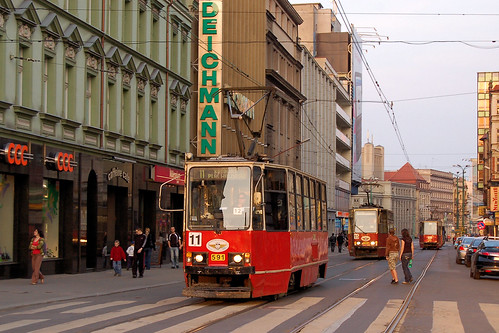How not to get in trouble while visiting Poland Posted by Kasia on Apr 16, 2016 in Places to visit, Regulations
Poland is a safe, civilised, wonderful country. You can have an awful lot of fun here in world-class cities without bags of cash or the worry that something is going to go wrong. But, like anywhere, Poland has it rules and regulations – and they may not be ones you’re used to.
Recently I read an article about US student getting in serious trouble in North Korea (read here). Very sad story…I can’t image this happening to my family or friends. Sometimes simple mistake leads to a huge problem in a different country. I usually try to research laws and regulations that apply in a country I’m about to visit. Something that is legal in USA, may not be necessarily legal in Poland or anywhere else.
I put together a list of few most important things you should keep in mind, before you decide to spend some time in my beautiful country of Poland!
I guess the most important one – don’t drink and drive (nie prowadź samochodu po alkoholu)!
Even if it was just one beer or just one glass of wine (I’m not even mentioning vodka!). First thing my husband noticed about my friends behavior in Poland was that they never drove after drinking (most of them :)).
The legal blood-alcohol level for driving in Poland is ZERO. Random checks are as real possibility.
Note that Polish drinking and driving laws also apply to bicycles. It might sound like a fun idea to rent some bikes and ride around town after a few afternoon beers, but it could prove a lot more expensive than anticipated. I actually remember one of my parent’s friend getting DWI when riding his bike after few beers!
Remember: stay safe and always have a designated driver.
Be aware of strip clubs and brothels! You’ve probably read somewhere that prostitution is legal in Poland and have mentally constructed all kinds of interesting scenarios. While it is true that there is no law against an individual selling sex, brothels are completely illegal. This doesn’t mean they don’t exist, they do, but if you step through the door be aware that you’re walking into a criminal world, and all that entails.
Public drinking and drunkenness is a big no no!
Polish cops have long, long experience of public drunkenness and they know exactly how to deal with it – by locking you up in a bare cell until long after you have a very sore head. Also, don’t wonder on the streets after drinking…this may get you in trouble as well, especially if you are loud and obnoxious and police car will just happen to drive past you…
How about crossing the street? (przechodzenie przez ulicę)
Only cross roads at marked pedestrian crossings, or face a 500zł fine. Wandering across the street anywhere you like, even when there is no traffic in sight, is illegal. The police are bored of foreigners trying to get out of these fines by claiming ignorance, so don’t even try it. And by the way, offering a bribe (łapówka) could get you a ticket straight to jail.
Some pedestrian crossings have lights (and a recorded voice) to tell you when you can cross. Crossings without lights must be treated with caution. Polish law says cars only have to stop if there is somebody already on a crossing, not if they are waiting to cross. But don’t expect traffic to screech to a halt the moment you step onto a crossing. Far better to wait for a big gap in the traffic than blowing your beer money on an intensive care unit bed.
Always remember to stamp your ticket while using public transportation!
In Poland, you can’t just buy a ticket and get on a bus or tram, you need to validate that sucker too. This means finding a validating machine on the bus or tram you are travelling on. The machine will stamp it with the date, time and your route. If you don’t do this, you’re travelling without a valid ticket and could be fined. Plainclothes ticket inspectors can pop up at any time and they don’t care that this isn’t the way it’s done on the No.7 to Ealing.
You can buy tickets from machines on the street (usually next to major bus/tram stops), from machines on some buses and trams, or from kiosks. But wherever you buy your ticket, you must validate it, even if you just bought it on the bus or tram you are on.
These are just few things to watch out for. So what to do if for some reason you will get arrested in Poland?
After your arrest, the police should inform you of your rights orally and in writing at the police station. In practice however, there are many cases where people are only informed about their rights in writing.
You must be informed about your rights in writing before the police interview is conducted and you will be asked to sign a document in Polish confirming that you understand your rights. If you do not understand Polish, you are entitled to an interpreter, who will translate the statement for you orally.
Your right to be informed about your rights does not depend on the seriousness of the offence that you are suspected of having committed.
In a nutshell, the rights you will be notified are that:
- You have the right to a lawyer;
- You have the right to an interpreter;
- You have the right to inform your consulate of your arrest if you wish to do so;
- You have the right to inform your family or friends of your arrest;
- There are, in general, no negative consequences if you fail to tell the truth (there may, however, be negative consequences if for example, you make false statements in order to falsely incriminate another person);
- You have the right to remain silent and that you can refuse to answer questions from the police;
- You have the right not to incriminate yourself (i.e. the right not to say anything that can work against your case);
- You have the right to ask for any investigation you think necessary;
- You have the right to provide the police with any evidence you think is necessary; and
- You have the right to lodge an appeal whenever is it possible according to the law
There are certain types of medical examinations that you may refuse when you are arrested, if they are particularly serious or intrusive, but you are not entitled to refuse certain examinations which pose no threat to your health (such as giving a blood sample, hair sample, providing fingerprints, being searched or psychiatric examinations).
You will also have to sign a protocol of the arrest, which explains the reasons for your arrest. A copy of this must be given to you.
Even if the police obtains evidence against you in violation of your rights, it may still be used in some situations against you at your trial. Polish law does not prevent unlawfully obtained evidence from being used by the prosecution.
From this point on, everything ma get complicated. I will try to dig into legal situations after being arrested next time and let you know more details about. But let’s hope, nobody will need it!
Stay safe and try not to get in trouble in Poland! After all, you are there to have some fun!

Build vocabulary, practice pronunciation, and more with Transparent Language Online. Available anytime, anywhere, on any device.
About the Author: Kasia
My name is Kasia Scontsas. I grew near Lublin, Poland and moved to Warsaw to study International Business. I have passion for languages: any languages! Currently I live in New Hampshire. I enjoy skiing, kayaking, biking and paddle boarding. My husband speaks a little Polish, but our daughters are fluent in it! I wanted to make sure that they can communicate with their Polish relatives in our native language. Teaching them Polish since they were born was the best thing I could have given them! I have been writing about learning Polish language and culture for Transparent Language’s Polish Blog since 2010.






Comments:
John Rudiak:
And you are not advised to drive the day after you party either. I liked this so much because it is so true.